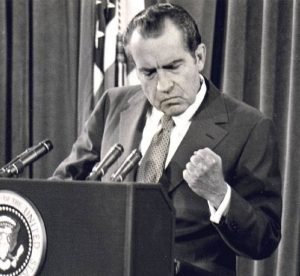
Any time we bring Nixon into the conversation, opponents want to drag in Watergate. Fair enough. Nixon is the only United States President who had to step down, and he did so in order to avoid being impeached. Without a doubt, he would have been convicted had he not stepped aside (and had Ford not pardoned him shortly afterwards). Those are historical facts, and we have no intention of ignoring Nixon’s warts. While I am convinced that on the whole, he was good for the country, he certainly made some poor decisions.
It is important to remember that Nixon had been in the public eye for nearly 30 years by the time he resigned the Presidency. He had been on 5 national tickets, after serving in both the House and Senate. It is noteworthy that he won 4 of the 5, and there is ample evidence that the one he lost, to Kennedy in 1960, was actually stolen. For now, we will just accept that he lost in 1960, but he came back in 1968 to win a tight contest, before running away with the victory in 1972, losing only Massachusetts and the District of Columbia. All of that to say, that from 1946 until his resignation in 1974, Nixon was in the public eye.
Along the way, as all politicians do, he made friends and enemies, and he stood, for the most part, against the hippy insurgency of the 1960s and 1970s, which certainly made him unpopular with many. So when he made some poor choices in the aftermath of the Watergate break-in, the country was all too ready to throw him under the bus, rather than to allow him to defend himself publicly. The fact is that he would have lost the Presidency regardless, so rather than damage the nation further, in a losing defense, he made the right choice and left of his own accord.
What is most important here for us to consider is what happened right after he resigned. Nixon had just intentionally humiliated himself on television, telling the entire nation that he was taking the unprecedented step of resigning. Rather than wallow in his own thoughts, feeling sorry for himself and his family, he came before his own personal White House staff and other White House employees, and addressed them in an impromptu speech:
You are here to say goodbye to us, and we don’t have a good word for it in English — the best is au revoir. We’ll see you again.
I just met with the members of the White House staff, you know, those who serve here in the White House day in and day out, and I asked them to do what I ask all of you to do to the extent that you can and, of course, are requested to do so: to serve our next President as you have served me and previous Presidents — because many of you have been here for many years — with devotion and dedication, because this office, great as it is, can only be as great as the men and women who work for and with the President.
Nixon turned his focus outward, to recognize those who had worked with him and supported him (and previous Presidents) and thanked them for their service. He goes on to thank them directly for all they had done. He admitted making mistakes, and that as the head of the government, he took the responsibility for those errors. He then encouraged everyone there to do what is right:
Always give your best, never get discouraged, never be petty; always remember, others may hate you, but those who hate you don’t win unless you hate them, and then you destroy yourself.
Here was a man who had been lambasted in the media, and in Congress. He took their punches, and in the end, he lost the battle. He was bruised and wounded, and it would take him the rest of his life to reclaim his role as a statesman, something he had started to achieve when he died. While he lost this battle, and his legacy will forever be marred by it, in this message to his staffers, he demonstrated that he had not lost the larger war. He alluded to Theodore Roosevelt, proclaiming that he was taking Teddy’s approach to life, especially after difficult circumstances. He spoke of when Roosevelt’s daughter died, and how Roosevelt persevered: And he not only became President but, as an ex-President, he served his country, always in the arena, tempestuous, strong, sometimes wrong, sometimes right, but he was a man.
That was what Nixon claimed for himself. He was knocked down, but by God, he was going to get up and be a man! We think that when we suffer a defeat that all is ended. We think, as T.R. said, that the light had left his life forever. Not true.
It is only a beginning, always. The young must know it; the old must know it. It must always sustain us, because the greatness comes not when things go always good for you, but the greatness comes and you are really tested, when you take some knocks, some disappointments, when sadness comes, because only if you have been in the deepest valley can you ever know how magnificent it is to be on the highest mountain.
Nixon knew that is what he had to do. In fact, that is exactly what he did do. He left office with a dismal 24% approval rating. By the time of his death, even a report from Cornell University admitted that “the man had successfully reinvented himself as a respected elder of American politics.” He was a man. He took the blows, but got up and struggled on.
How was he able to do that? I am sure there are many reasons why, including his own internal drive to succeed. But if we stop and look at the darkest day in his life, the day he had to resign the Presidency, we can see one important factor. He was not focused inward on his pain. He acknowledged that there were others who mattered, and in his wounded state, he pushed his own needs aside and served those who had served him.
He was part of a community, and he did not forget them. In his final words – and note that this came straight from his heart; it was not prepared, but given off the cuff – he gave us something to consider and emulate:
And so, we leave with high hopes, in good spirit, and with deep humility, and with very much gratefulness in our hearts. I can only say to each and every one of you, we come from many faiths, … but I want to say for each and every one of you, not only will we always remember you, not only will we always be grateful to you but always you will be in our hearts and you will be in our prayers.
Thank you very much.










How far we come in less than 50 years. Here is a man who had already taken office only to resign in the wake of an impeachment and inevitable removal from office. That is the normal order of things. That is what we can expect. But today we have no reservations about nominating and possibly electing someone who is already impeachable to the very same office from which Nixon resigned. Someone who has already dishonored the American people and the office they seek by simply running for election. That one poses a far greater danger to this nation than the one who resigned in disgrace so that the nation would not incur further damage. Today we face the real possibility of seeing someone elected to office who could c are less how much damage she has to inflict just to occupy the White House. G-d help us all if her bid is successful and shame on us for creating an environment where this is even possible. Maybe it’s the American people need to be impeached.
” Maybe it’s the American people need to be impeached.”
That… is likely the inevitable consequence of this insanity
Maybe it’s the American people need to be impeached
That’s the plan.
Damn I love this series.
This is a fine piece of writing, filled with thoughtful study and comment as well as those who have, thus far, offered their insights.
Nixon took responsibility whereas our current political class seek to blame others even when a bind man can clearly see they are completely dishonest snakes.
I am trying to show Nixon faithfully, warts and all. At the same time, I do intend to highlight those positive aspects from which we can learn.
It doesn’t matter as much how you ended up face-planted on the mat as what you do next.
Nixon took a haymaker to the jaw and got knocked down. But he didn’t stay down, nursing his grudges.
Like T.R., he was a flawed man, but plenty of strengths worth examining and emulating.
It seems that he was a true model of maturity in facing his shortcomings and dealing with the fallout of actions. That is maturity.
indeed. And perseverance. Lots of mature men and women would’ve crawled into a hole to lick their wounds.
I suppose we have to keep in mind that he was a politician who rose to prominence quickly, and after all the Washington infighting became a bit jaded in many ways, but he always seemed to find his center.
Certainly, he was calculating and made many mistakes, but he was a fighter, who admitted his faults and took his punishment like a man.
I find it hard to respect politicians. Mostly because the vast majority of them are utter vermin, however, I learnt an important point from your essay here, and I think I noticed it mostly because I am essentially very much still a heathen until my recent past. There is something Christian in the positive side of what Nixon did.
I also do not trust nor respect many politicians. Nixon certainly got down in the dirt on many occasions, but I believe he came to view himself as an outsider (from the inside) and fought against the establishment in many ways. That is why he had to be brought down.